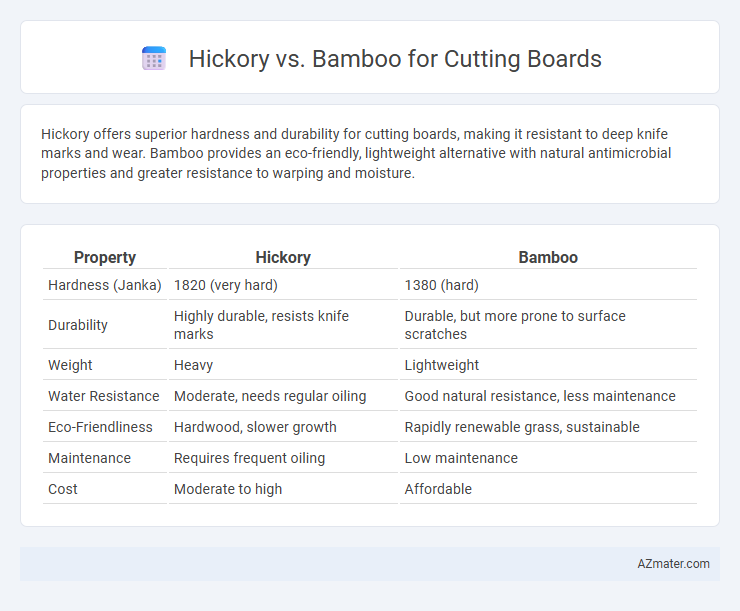Hickory offers superior hardness and durability for cutting boards, making it resistant to deep knife marks and wear. Bamboo provides an eco-friendly, lightweight alternative with natural antimicrobial properties and greater resistance to warping and moisture.
Table of Comparison
| Property | Hickory | Bamboo |
|---|---|---|
| Hardness (Janka) | 1820 (very hard) | 1380 (hard) |
| Durability | Highly durable, resists knife marks | Durable, but more prone to surface scratches |
| Weight | Heavy | Lightweight |
| Water Resistance | Moderate, needs regular oiling | Good natural resistance, less maintenance |
| Eco-Friendliness | Hardwood, slower growth | Rapidly renewable grass, sustainable |
| Maintenance | Requires frequent oiling | Low maintenance |
| Cost | Moderate to high | Affordable |
Introduction: Why Material Matters for Cutting Boards
Hickory and bamboo each offer distinct advantages as cutting board materials, with hickory renowned for its extreme hardness and durability, making it resistant to deep knife marks and ideal for heavy chopping. Bamboo, a sustainable and eco-friendly option, boasts natural antimicrobial properties and a lighter weight, facilitating easy handling and maintenance. Choosing the right material impacts knife longevity, board hygiene, and overall kitchen performance.
Overview of Hickory and Bamboo Cutting Boards
Hickory cutting boards are known for their extreme hardness and durability, making them resistant to scratches and dents from heavy knife use. Bamboo cutting boards offer an eco-friendly alternative, growing rapidly and providing a naturally antimicrobial surface that resists moisture absorption. Both materials are popular choices for their combination of strength and maintenance ease, but hickory tends to be heavier and denser compared to the lighter, more flexible bamboo.
Durability Comparison: Hickory vs Bamboo
Hickory offers exceptional durability for cutting boards due to its dense hardwood structure, making it highly resistant to knife marks and wear over time. Bamboo, although harder than many traditional woods, is more prone to cracking and splintering under heavy use because it is a grass product compressed into boards. When comparing longevity, hickory cutting boards generally outperform bamboo in maintaining structural integrity under frequent chopping and heavy-duty kitchen tasks.
Knife Friendliness and Surface Hardness
Hickory cutting boards offer high surface hardness, making them durable but potentially harsher on knife edges, which can dull blades faster over time. Bamboo, while harder than many hardwoods, provides a slightly more forgiving surface that maintains knife sharpness longer due to its natural resilience and less abrasive texture. Selecting between hickory and bamboo depends on balancing the need for durability with preserving knife longevity in kitchen tools.
Maintenance and Care Requirements
Hickory cutting boards require regular oiling with mineral oil to prevent drying and cracking, while bamboo boards benefit from similar oil treatments but are generally more resistant to moisture due to their dense grain. Both materials should be hand-washed promptly after use and thoroughly dried to avoid warping or mold growth. Avoid soaking or dishwasher cleaning for either wood type to maintain durability and prolong lifespan.
Hygiene and Bacterial Resistance
Hickory cutting boards offer moderate bacterial resistance due to their dense grain and natural antimicrobial properties, making them relatively hygienic with proper maintenance. Bamboo cutting boards exhibit superior hygiene because of their closed-grain structure and high silica content, which naturally resists water absorption and bacterial growth. Both materials require regular cleaning and drying to prevent contamination, but bamboo's hardness and water resistance provide an edge in long-term bacterial resistance and hygiene.
Environmental Impact and Sustainability
Bamboo cutting boards have a lower environmental impact due to rapid growth rates and renewable harvesting practices, making them highly sustainable compared to traditional hardwoods. Hickory grows more slowly and requires longer harvest cycles, contributing to greater resource depletion and less sustainable production. Bamboo's ability to regenerate quickly without replanting significantly reduces deforestation and soil erosion associated with hickory lumber.
Price and Availability
Hickory cutting boards are generally more affordable, with prices ranging from $20 to $50, and are widely available in most hardware and kitchen supply stores across North America. Bamboo cutting boards tend to be slightly more expensive, typically priced between $25 and $60, but are increasingly accessible due to rising popularity and eco-friendly demand in major retailers and online platforms. Both materials offer reliable availability, though bamboo's sustainable appeal often makes it a preferred choice for environmentally conscious consumers.
Pros and Cons: Hickory vs Bamboo Cutting Boards
Hickory cutting boards offer exceptional durability and resistance to knife marks, making them ideal for heavy-duty kitchen use, but they can be heavier and require regular oiling to prevent cracking. Bamboo cutting boards are eco-friendly, lightweight, and naturally antimicrobial, yet they tend to be harder on knives and less resilient to deep cuts compared to hickory. Both materials provide unique advantages: hickory excels in longevity and toughness, while bamboo stands out for sustainability and low maintenance.
Which Cutting Board Material Is Right for You?
Hickory cutting boards offer exceptional hardness and durability, making them ideal for heavy-duty kitchen tasks and resistance to knife marks. Bamboo boards provide a sustainable, eco-friendly option with natural antibacterial properties and lighter weight, suitable for everyday use and easy maintenance. Choosing between hickory and bamboo cutting boards depends on your preference for long-lasting sturdiness versus environmental sustainability and ease of handling.

Infographic: Hickory vs Bamboo for Cutting Board
 azmater.com
azmater.com